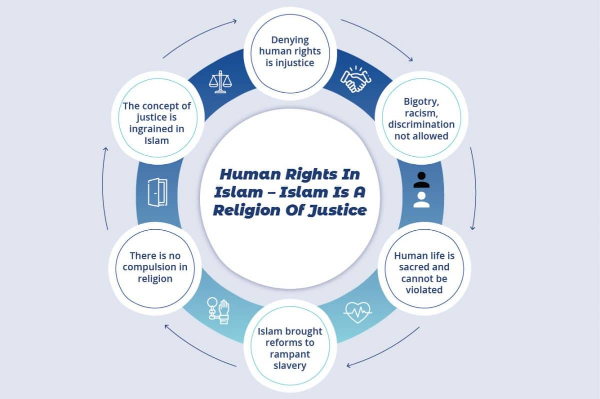Human Rights in Islam have become a universally accepted concept in modern times, seen as fundamental to basic human dignity and justice across all societies. However, the origins and principles upholding human rights can be traced back to some of the world’s earliest legal and ethical systems, including Islamic law.
While the modern notion of human rights is often associated with Western democratic ideals that emerged in recent centuries, Islamic law or Shariah incorporates protections for basic human freedoms and rights that greatly influenced the development of human rights standards globally.
This essay will examine some of the key human rights principles found in Islamic legal tradition, including the right to life, freedom of religion, protection of private property, rights of women and children, and more. It aims to demonstrate how Islamic jurisprudence has long upheld the importance of human dignity and established legal safeguards for individuals that laid the philosophical foundations for what are considered universal human rights today.
The concept of human rights in Islamic law
The concept of human rights in Islamic law is rooted in the principles and teachings of Islam. Islam places great emphasis on the dignity and worth of every human being, and it recognizes the inherent rights and freedoms that all individuals possess. These rights are derived from the Quran (the holy book of Islam) and the teachings and practices of the Prophet Muhammad (peace be upon him).
Islamic law, also known as Sharia, encompasses a comprehensive framework for human rights within the Islamic legal tradition. It addresses various aspects of human rights, including individual freedoms, social justice, equality, and protection of life, property, and honor. Some key principles of human rights in Islamic law include:
1- Right to Life
Islam considers human life to be sacred and prohibits the unjust taking of life. The Quran states, “Whoever kills a person, it is as if he has killed all mankind” (Quran 5:32).
2- Right to Freedom
Islamic law recognizes the importance of personal freedom and prohibits slavery, forced labor, and arbitrary detention. It emphasizes the value of individual autonomy and free will.
3- Right to Equality
Islam upholds the principle of equality among all individuals, regardless of their race, ethnicity, or social status. The Quran states, “O mankind, indeed We have created you from male and female and made you peoples and tribes that you may know one another. Indeed, the most noble of you in the sight of Allah is the most righteous of you” (Quran 49:13).
4- Right to Justice
Islamic law emphasizes the importance of justice and fair treatment for all individuals. It promotes the rule of law, due process, and equality before the law. Islam encourages individuals to seek justice and forbids oppression and injustice.
What is the importance of human rights?
The importance of human rights lies in the recognition and protection of the inherent dignity and worth of every human being. Human rights provide a framework for promoting justice, equality, and freedom in societies. They contribute to the well-being and flourishing of individuals, fostering harmonious and inclusive communities. rights also serve as a safeguard against oppression, discrimination, and abuse of power. They ensure that individuals have the opportunity to live with dignity, express their opinions, pursue education, work, and participate in political and social life.
Moreover, the respect for human rights is essential for fostering peace, stability, and sustainable development. When human rights are protected and upheld, it creates an environment conducive to social progress, economic prosperity, and the realization of individual and collective potential.
In summary, the importance of human rights lies in their fundamental role in upholding the dignity, equality, and well-being of all individuals, fostering justice, and promoting harmonious and inclusive societies.
You can also see: Islamic Fiqh
What are the types of human rights in Islam?
In Islam, human rights are categorized into two main types:
1- Huquq Allah (Rights of God)
These rights pertain to the relationship between an individual and their Creator. They include the following:
-
Right to Worship
Islam recognizes the freedom of religion and the right of individuals to worship according to their beliefs. Muslims are obligated to worship and submit to Allah alone, as outlined in the Five Pillars of Islam.
-
Right to Observe Religious Duties
Muslims have the right to fulfill their religious obligations, such as performing prayers, fasting during Ramadan, giving charity (Zakat), and undertaking pilgrimage (Hajj) if they have the means.
-
Right to Spiritual Development
Islam emphasizes the spiritual growth and well-being of individuals. Muslims have the right to seek knowledge, engage in acts of devotion, and strive for personal purification.
You can also see: Islamic Law
2- Huquq al-‘Ibad (Rights of Individuals)
These rights pertain to the relationships between individuals and society. They encompass a broad range of rights and responsibilities, including the following:
-
Right to Life
Islam considers human life to be sacred and prohibits the unjust taking of life. Protecting and preserving life is a fundamental right in Islam.
-
Right to Personal Freedom
Islam upholds the principle of personal freedom and dignity. It prohibits slavery, forced labor, and arbitrary detention. Individuals have the right to make choices, express their opinions, and pursue their aspirations within the bounds of Islamic principles.
-
Right to Justice and Fair Treatment
Islam emphasizes the right to justice and fair treatment for all individuals. Islamic law promotes the rule of law, due process, and equality before the law. It prohibits oppression, discrimination, and the abuse of power.
-
Right to Equality
Islam recognizes the equal worth and dignity of all individuals, regardless of their race, ethnicity, or social status. It discourages discrimination and encourages mutual respect and cooperation among people.
-
Right to Property
Islam recognizes and protects the right to own and possess property. It encourages individuals to acquire wealth through lawful means and advocates for the fair distribution of wealth and resources.
-
Right to Privacy
Islam acknowledges the right to privacy and the protection of personal honor and reputation. It prohibits unauthorized intrusion into the privacy of individuals and emphasizes the importance of maintaining modesty and decency in personal interactions.
- Right to Education
Islam emphasizes the importance of education and the acquisition of knowledge. Muslims have the right to seek education and gain knowledge in various fields to benefit themselves and society.

You can also see: Islamic sciences
Sources of human rights in Islam
The sources of human rights in Islam are derived from primary and secondary sources of Islamic law. The primary sources of Islamic law are considered to be divinely-revealed and include the following:
1- The Quran
The Quran is the holy book of Islam, believed by Muslims to be the word of Allah as revealed to the Prophet Muhammad. It contains principles and teachings that emphasize the dignity, rights, and responsibilities of individuals.
2- The Sunnah
The Sunnah refers to the recorded actions, sayings, and approvals of the Prophet Muhammad. The Sunnah provides practical guidance on how to implement the teachings of the Quran and serves as a source of moral and legal guidance for Muslims.
The secondary sources of Islamic law, known as the principles of jurisprudence (Usul al-Fiqh), are derived from scholarly interpretation and deduction based on the primary sources. These sources include:
3- Ijma (Consensus)
Ijma refers to the consensus of Islamic scholars on a particular legal ruling or interpretation. It is considered an important source for determining human rights in Islam as it reflects the collective wisdom and understanding of the Muslim scholarly community.
4- Qiyas (Analogical Reasoning)
Qiyas involves deriving legal rulings for new situations by analogy to existing rulings based on similar underlying principles. It allows scholars to apply the principles of the Quran and Sunnah to contemporary issues and contexts.
5- Ijtihad (Independent Reasoning)
Ijtihad refers to the process of independent legal reasoning and interpretation by qualified Islamic scholars. It allows them to derive legal rulings based on the primary sources and secondary sources of Islamic law, taking into account the social, cultural, and historical context.
6- Maslaha (Public Interest)
Maslaha refers to the consideration of public interest and the welfare of society in legal rulings. Islamic scholars use this principle to ensure that human rights are protected and promoted in a manner that benefits individuals and society as a whole.
You can also see: Islamic Personality
It is clear from this explanation that human rights in Islamic law are a crucial and indisputable issue, as man in Islam has many rights and duties, and from this point of view, we find in Abrar Academy a great interest in highlighting these rights, and working to spread them among different cultures in order to consolidate in the individual, the extent of this true religion’s interest in human rights to a decent living, care, health and education as well.
On the other hand, the Academy works to teach all Quranic and Islamic sciences, including the science of tajweed, the science of readings, jurisprudence and the origins of hadith, and also provides educational courses for non-Arabic speakers, and gives experimental classes for children to measure their performance, and you can now simply subscribe to a trial class to follow up on your child’s performance with a group of sheikhs graduated from Al-Azhar University.



